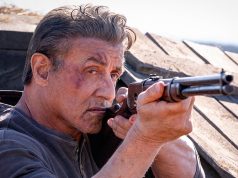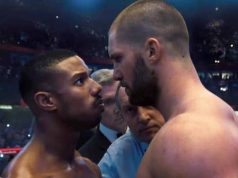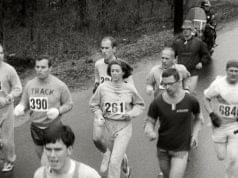
“Over the Top” is about the glamorous, highly competitive world of professional arm-wrestling. Its failure to connect with moviegoers in 1987 can probably be traced to the virulent anti-arm-wrestling propaganda that was so prevalent in the liberal media at the time.
No, I’m kidding. The reason it failed at the box office was probably that it sucked and was about arm-wrestling. On the other hand, it could have been that it didn’t have enough arm-wrestling to satisfy the demands of an arm-wrestling-hungry audience. Indeed, when you look at it analytically — and what better way to look at “Over the Top” than analytically? — the film has only a few scenes of hot, sweaty arm-wrestling action, the bulk of its running time being filled with a story about a deadbeat father reconnecting with his estranged son. Which is BORING. Look, if someone’s humerus isn’t being snapped in half, I’m not interested. That is a longstanding policy of mine.
The arms central to the film belong to Sylvester Stallone, so you can bet they’re swarthy and oiled. Stallone, who also co-wrote the monosyllabic screenplay, plays a trucker named Lincoln Hawk who walked out on his wife and son 10 years ago. The son, Michael (David Mendenhall), now 12 years old, is graduating from a military academy in Colorado, and Hawk shows up after the ceremony to drive him to California. The reason for this, ultimately, is that the movie needed an excuse for Hawk and Michael to spend time together and bond. In the story, it’s because Hawk’s ex-wife is about to have heart surgery and she wants Hawk to reconnect with Michael, and what better way than driving a thousand miles together? But most of that doesn’t make sense, so I’m disregarding it.
Michael has no solid memories of his father and is understandably resentful of him. He’s grown up in the lap of luxury, thanks to his mother’s father, Jason Cutler (Robert Loggia), being a millionaire. Hawk says he’s been writing letters to Michael for years, but Michael never saw them, obviously because mean old Grandpa has been hiding them. Cutler never liked the middle-class Hawk and was glad to have his daughter and grandson rid of him. But Hawk seems to have been in touch with his ex-wife quite a bit, so wouldn’t he have learned that Michael wasn’t getting his letters? And how come people in movies who interfere with personal correspondence in this manner always KEEP the letters, usually in a shoebox somewhere, thus allowing them to be found years later by the intended recipient, who will be furious? Wouldn’t it make more sense to destroy them?
Anyway, Michael is a snob whose academy training has intensified his elitism and conditioned him to call everyone “sir,” which is a strange term to hear applied to Sylvester Stallone. Hawk is eager to make up for lost time and get Michael to warm up to him, but Michael thinks his dad is a big dumb trucker, which isn’t fair, because he’s really not all that big. To prove to Michael that he’s smart and that driving a truck actually takes brains, he moves to the passenger seat and lets Michael drive, to see how well HE does at it. Of course, being intelligent is not the same thing as having training and practice at something, and the fact that Hawk thinks it is just proves his son’s point, i.e., that he’s stupid. Then Michael actually does an OK job of driving the truck, further obliterating whatever point Hawk was trying to make. Hawk should quit while he’s behind.
Over the course of their travels, we learn that Hawk is a competitive arm-wrestler who’s training for an upcoming major tournament in Las Vegas. He is reluctantly drawn into an impromptu match at a roadside diner, trouncing his burly opponent and starting to inspire some respect in Michael’s eyes. At the next stop, Hawk pushes Michael into a match with a belligerent kid his age, apparently trying to prove, once and for all, that he really is a terrible father. Through Hawk’s inspiring words, Michael is driven to succeed, and he beats the bully in a best-of-three series. Of course, his newfound machismo over having won an arm-wrestling contest is probably diminished somewhat by having his dad hug him afterward, but still. The bond is formed. Brute strength wins again! Take that, Dr. Phil.
So far the film is pretty boring, consisting mainly of scenes of Hawk and Michael in the cab of a big rig, growing to love one another while cheesy rock scenes play on the soundtrack. Some excitement breaks out when Cutler, furious that his daughter has allowed that no-good Hawk to drive Michael to California, sends two of his goons to abduct Michael and bring him home. The excitement is mainly in wondering how the goons knew exactly where between Denver and Los Angeles they could find Michael, and at which particular roadside diner. Are the goons psychic?? Do they possess supernatural powers??! See, it’s very exciting.
Fortunately, after Hawk pursues the villains in his truck and rescues Michael, the excitement subdues and the film settles back into its boring pace. Hawk doesn’t even bother to call the police over the kidnapping, as that would only lead to more excitement, and heaven forbid there should be any excitement in a movie about a &*@!% professional arm-wrestler.
Hawk and Michael get to L.A. just in time to miss seeing Michael’s mom, who died in surgery that morning. But if the surgery was scheduled for that morning, why didn’t they hustle to get there sooner? Wasn’t the WHOLE POINT for Michael to see his mother before she went under? Why did they dawdle when they knew they had a deadline? I don’t even know why I try with you, movie.
Michael’s new and tenuous love for his father is shattered by this screw-up, and he runs to the wealthy, wizened arms of his grandfather, who takes him to his fancy mansion and yells at Hawk to go away. Hawk shows up one night at the mansion insistent on seeing his son, then drives his truck through the gate and across the yard and smashes into the front of the house. Somehow, this clever plan fails to yield him custody of his son.
Hawk has to leave for Vegas now, for the tournament — remember, this movie is actually about arm-wrestling — and while he’s gone, that’s when Michael finds the packet of letters that Grandpa Cutler had stupidly stashed away. Having had a change of heart and now wanting to live with his dad permanently, 12-year-old Michael steals one of his grandfather’s cars and drives to the airport. If nothing else, this proves that he inherited some of his dad’s dumb-idea DNA.
Finally, we’re in Vegas for the arm-wrestling. It’s being televised, though I don’t know how, since ESPN-2 didn’t exist yet. It’s a double-elimination tournament, meaning a competitor can lose once and still be in the game, a fact that is mentioned by the announcers no fewer than six times. And I bet there were still some viewers who, upon seeing Hawk lose a match, bellowed at the screen, “OH NO!! HE LOST!! HE’S OUT OF IT NOW!!!”
You will not be surprised to learn that Michael managed to buy a plane ticket and fly to Las Vegas and get to the tournament just in time to appear in the crowd and inspire his father. They have a heart-to-heart talk between matches where Michael reminds Hawk of Hawk’s own personal motto: “The world meets nobody halfway. If you want something, you have to take it!”
Yes, the world meets nobody halfway. This creed is reiterated several times throughout the film, though it might have had more impact if the movie’s main theme song weren’t called “Meet Me Halfway.” I mean, how can I meet you halfway when we’ve already established that the world in general meets nobody halfway? Are you presumptuous enough to suggest that though the world meets nobody halfway, I can do it? That’s ridiculous. I appreciate your confidence in me, but the fact is, nobody can meet anybody halfway. Meeting halfway just isn’t done.
Then Hawk wins the tournament and gets a lot of money and Cutler gives up on trying to get custody of Michael and they all live happily ever after, except for Mom, who of course is still dead. The movie doesn’t explain why Cutler stops battling for custody of his grandson, so I have to assume it’s because his grandson is an insufferable know-it-all. Yes. Let’s go with that. The end.
— Film.com





